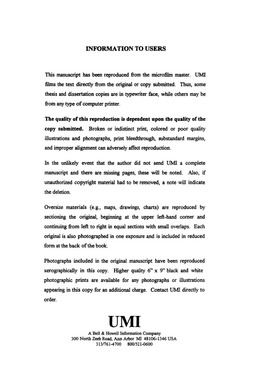| dc.contributor.advisor | Fox, Robert David, | en_US |
| dc.contributor.author | Price, Michael Allen. | en_US |
| dc.date.accessioned | 2013-08-16T12:29:46Z | |
| dc.date.available | 2013-08-16T12:29:46Z | |
| dc.date.issued | 1997 | en_US |
| dc.identifier.uri | https://hdl.handle.net/11244/5494 | |
| dc.description.abstract | Implications for educators are that experience serves as the organizing principle for learning in professional practice and that customs and work conditions peculiar to each profession ultimately color the process of change and learning. | en_US |
| dc.description.abstract | Findings included the following: Architects most often used learning as a means of making incremental adjustments in practices. Most learning was self-directed and involved informal resources and methods. Formal learning was found in only 14% of cases. Learning most often occurred during the course of working on projects and focused on finding solutions to immediate problems. Changes were driven by forces from within the profession, the firms for whom the architects worked, society, and the personal desires of the architects. Professional forces were most likely to lead to change and learning. Personal forces were most likely to lead to major changes involving long-term learning efforts. Patterns of change and learning at the conceptual level were similar to those discovered in the study of physicians; however, substantive differences between professions were also found. Among these were the role firms play in shaping the changes and strategies for learning among architects and the architects' reliance on anecdotal knowledge. | en_US |
| dc.description.abstract | This study examined the role of learning in the process of change in professional practice among a selected group of twenty-seven architects. It identified patterns of change and learning and discovered theories explaining those patterns. The study used a qualitative approach similar to the study of change and learning among physicians conducted by Fox, Mazmanian, and Putnam. The method of inquiry and analysis followed Straus and Corbin's recommendations for grounded theory research. Through face-to-face interviews architects described recent changes in their professional practices and why and how they had made them. | en_US |
| dc.format.extent | xiv, 185 leaves : | en_US |
| dc.subject | Architecture. | en_US |
| dc.subject | Education, Adult and Continuing. | en_US |
| dc.subject | Change. | en_US |
| dc.subject | Education, Higher. | en_US |
| dc.subject | Adult learning. | en_US |
| dc.subject | Professional education. | en_US |
| dc.subject | Architects. | en_US |
| dc.title | Patterns of change and learning in the practices of selected Oklahoma architects. | en_US |
| dc.type | Thesis | en_US |
| dc.thesis.degree | Ph.D. | en_US |
| dc.thesis.degreeDiscipline | Department of Educational Leadership and Policy Studies | en_US |
| dc.note | Adviser: Robert David Fox. | en_US |
| dc.note | Source: Dissertation Abstracts International, Volume: 58-03, Section: A, page: 0698. | en_US |
| ou.identifier | (UMI)AAI9728714 | en_US |
| ou.group | Jeannine Rainbolt College of Education::Department of Educational Leadership and Policy Studies | |
